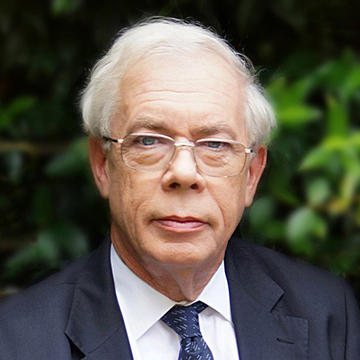PROFESSOR JOHN KAY (NUFFIELD, 1969)

PROFESSOR JOHN KAY (NUFFIELD, 1969)
Emeritus Fellow and economist John Kay talks about his new book Greed is Dead: Politics After Individualism
Published: 11 November 2020
Share this podcast
QUAD editor, Richard Lofthouse interviews economist John Kay about his new book, co-authored with Professor Paul Collier - Greed is Dead: Politics After Individualism.
The book is in part a manifesto and part an observation, with acute commentary on Brexit, inequality, the utter wrongness of much that passes for economic orthodoxy and the importance of place.
Richard Lofthouse 0:02
So thank you very much indeed, John, for meeting today. Let's start with the book. It's called Greed is Dead: Politics after Individualism. And you co-wrote the book with Paul Collier, also faculty at Oxford. I just wanted to start really by asking
you where the book came from and where this title came from.
John Kay 0:26
The genesis of the book, actually, it was a lunch at The Giggling Squid, which is a fish restaurant in Walton Street in the autumn of 2019. And it was really prompted by having a conversation about the work we'd each recently done - Paul's book The
Future of Capitalism, my book on Radical Uncertainty. And setting all of this in relation to the political conjuncture in the UK and more widely, as it was at that time.
Richard Lofthouse 1:06
The book was obviously written at some speed, and it has an air almost of a manifesto about it in places. Did COVID make any difference to how it was conceived and written?
John Kay 1:18
I think not very much. I think COVID gave point to some of the issues we raised. It's funny the way doing joint work like this has been changed quite a lot by technology. So that having long calls on Skype or something else, and particularly most
of all, having a single manuscript in the, in the cloud, that both the authors and other people helping us can actually work on
Unknown Speaker 1:52
The foundational idea that greed is dead, is a play on Gordon Gekko's Wall Street, the film, The Michael Douglas film in 1987. Is that right?
Unknown Speaker 2:05
It is yes. Although that is slightly further back to the the 'greed is good' phrase. And the film is almost certainly drawn from a speech that Ivan Boesky, who was eventually convicted of insider trading, gave a couple of years earlier, when he told
a university audience, greed is good, by the way I want you to, ...or greed is all right. 'By the way, I want you to know that you can be greedy and still feel good about yourself.'
Richard Lofthouse 2:40
That's a really nice way to lead into the book. What's changed since then? What are we now saying in 2020? This is very clear in the book, especially in the section at the end about further reading, suddenly, we're in a moment when greed is not good
anymore. In fact, in this case, we're saying it, it may even be dead, what's what's going on?
John Kay 3:04
I'm not sure it's dead, so that out there in the world, because there's certainly plenty of greed still around. We argue that it's dead as an intellectual idea that the era of 'greed is good', is coming to an end. I'd take it even further back in
a way to the famous article by Milton Friedman in 1970, the social responsibility of businesses to maximise its profits. And that's absolutely the era that I would like to declare the end of.
Richard Lofthouse 3:39
What's replacing it?
John Kay 3:43
There's not enough discussion at the moment about corporate purpose. The discussion at the moment about corporate purpose is helpful. And on the right lines. It's saying the question, the business has to have a purpose beyond profit, otherwise it
lacks legitimacy and fails even as a business in the long run. But purpose needs to be distinguished from vacuous statements of 'we aim to exceed our customers expectations'. Better the communities in which we operate, which I'm afraid is what a lot
of companies think.
Richard Lofthouse 4:31
The book has several distinct themes. And obviously, the co-author Paul is not here to throw in his hat into the ring. But one of the big themes is the importance of place. ... The idea that place matters and in some ways it's been ignored or just
forgotten by politicians over a long period of time. Is that something that you share?
John Kay 5:14
That's absolutely something we share. But we we like the distinction that David Goodhart made between 'somewheres'and 'anywheres'. And most people are 'somewhere' with a rather strong sense of place. Whereas Paul and I are both people who got basically
left when we left school, the place where we we've been brought up, and we go back there now as visitors, not as people who live there anymore.
Richard Lofthouse 5:54
Well, you're originally from Edinburgh, and Paul from Sheffield. So there's a definite feeling of wanting to reconnect the regions and parts of the UK that perhaps have been neglected from from a Westminster perspective and even an Oxford perspective.
Is that the case?
John Kay 6:13
Like, as you say, I come from Edinburgh, which is probably the UK's most successful regional centre outside London, and Paul comes from Sheffield, which is not.
Richard Lofthouse 6:31
Going back to that lunch of the giggling squid. Was there a particular 'penny drops' moment?
John Kay 6:40
No, I wouldn't say that was. And it was just a discussion. And when we realised how much we had in common, the way we were thinking.
So one of my questions, john, was whether this book could have been written before the great financial crash of 2008-2009. What do you say to that?
I think a book could have been written. And if I think about my own position in relation to that this underlying philosophy of this book is communitarian. And I became communitarian, in a really interesting way in the 1990s, when I got to know about business
for the first time in the sense of actually coming into frequent contact with real people in real businesses. And I taught standard economics for 20 years in which people were maximising everything because firms were maximising the profits. And it
was the realisation going out into the world that most people weren't maximising anything.
Richard Lofthouse 8:01
So the vagaries of actual lived life are really quite different from the economic models.
John Kay 8:10
That was what I understood then.
And then before the financial crisis, people say nobody predicted the financial crisis. That's true in one sense, but it's also quite wrong in another. Nobody did predict that would blow up in the way it did in September 2008. But knowing that what was
going wrong was taking us badly astray, was, I think, perfectly clear to me and a lot of people in the five years before 2008.
Richard Lofthouse 8:49
And in fact, in the book, he mentioned several individuals, I think it was the head of the World Bank who spoke very vocally about systemic risks that were piling up as early as 2005. And no one bought it, nobody wanted to hear it.
John Kay 9:05
That was actually Raghuram Rajan who wasn't head of the World Bank. He was chief economist of the IMF. And he was, he made this point and he was denounced as a Luddite and someone who didn't understand the benefits that financial innovation will
bring to the world.
Richard Lofthouse 9:27
And then if we shortcut to 2020, notwithstanding all the economic setbacks brought on by the pandemic, is your feeling that systemic risk is better or worse now than it was in 10 years ago.
John Kay 9:45
It's better but not much, you'll never have the same crisis again, but many of the underlying causes of this were largely unaffected and the core problems as I see it, a financial sector that is increasingly very largely focused on issues that have
nothing to do with what is going on in the real non financial economy. That remains true.
Richard Lofthouse 10:14
That's one of the other themes of the book, I think that business should be primarily devoted to solving problems that can be solved by a business in society, and not just indulging in financial gaming and other models of get rich quick...is that
fair?
John Kay 10:34
In my Other People's Money book I talk about this in relation to the financial sector. In this book, we talk about it rather than more in relation to business more generally. And it's back to this issue of business having a purpose. The rationale
of business is to produce goods and services that people want, to provide employment that people find fulfilling. And in the process of doing that, to generate returns for savers and people who invest in it.
Richard Lofthouse 11:08
One of the big themes of the book, this really gets to the heart of it, I think, is that throughout the - perhaps even going back to the 1990s, - Britain in particular has gone through a strange process, whereby consumption is in some respects gone
up, but partly because of welfare and benefits that do not equate to individual fulfilment and happiness. And so when we talk about North South divide, or other forms of regional inequality, that's partly what you refer to in the book, isn't it that
that.
John Kay 11:43
Yeah, And then people talk a lot about inequality. But it's not primarily economic inequality we're talking about a motif of the book, which is intended to run through it, and I hope does is we take these two formerly labour constituencies of Don
Valley and Stoke-on-Trent North. And describe first of all how these were seats, which in the 1960s, you weighed Labour's votes rather than counted them, and both of them were seats that went Conservative in 2019. Now, that wasn't something that happens
suddenly, as a result of Corbyn and Brexit. It was something that had been happening for 50 years. And if you look at the underlying trends in these places, what was happening was Stoke was a ceramic centre, Don Valley a mining centre. These industries
were hollowed out. Now, that doesn't mean and this is important, that people in these areas are either poor or unemployed. They're not particularly prosperous areas. But they're not particularly poor areas either. And they're not areas that have high
levels of unemployment. But actually, the major employer in the Don Valley area now is actually Amazon, because it's a logistics centre, with loads of warehouses. And the largest employer in Stoke is actually Bet365, which is an online gambling service.
These are jobs that are reasonably paying jobs. But they're not jobs that have the intrinsic satisfaction of a sense of community, that people had in these other industries. And ones not simply being nostalgic, and I'm glad people aren't going down
the mines anymore. But there's a kind of loss of respect of dignity and so on, which is actually a much, much larger factor in what we're talking about than the simple economics of it.
Richard Lofthouse 13:58
I think there's a part of the book which really goes there and actually does refer to Brexit as being linked to everything you've just said, not in a simplistic fashion, but that there was a resentment, there was a dislocation between an elite who
have done well and do find dignity and satisfaction in their work and a great number of people who do not, - is that your view as well?
John Kay 14:28
Yes, it is. I have the feeling that many people in Oxford do not understand that. A large part of the resentment is not directed at some kind of capitalists or people with large cigars and that sort of thing. Technically, people like us have done
well out of the meritocratic system.
Richard Lofthouse 15:03
There was a bit of the book, John that quite surprised me because I didn't fully understand it perhaps but meritocracy is held up as a potentially difficult subject. Whereas we've been led to believe that meritocracy is great because if you're worthy
of something through talent, that's, that's right. Because you're not attaining a position in society for reasons other than your, your talent. But you cite a book by Lord Young, in which meritocracy is presented as a dystopia in 2033 I think it was
in Britain, what's going on there?
John Kay 15:43
That's right. And it's Michael Young, who actually invented the term meritocracy. And this book, The Rise of the Meritocracy was about a dystopia. ...it's what the world would be like in 2033, if it went down this path, and he didn't like it. And
he wrote an article 14 years later, actually, in which he said precisely that. And there's a line in that which I think is very powerful, which is says that to be told in a society in which success is determined by merit, that you lack merit, no underclass
he says has ever been left as morally naked as that.
I hope everyone listening to this would think of the implications of that code of observation.
Richard Lofthouse 16:42
Just spin that out a little bit more for an audience who might be quite surprised to hear that it's quite new thinking in some ways, obviously, it's old thinking as well. And not new to the reference that that there, but what's the implication of
that?
John Kay 17:00
The implication is we haven't really thought through the problems of creating a society in which people actually, we've done a great deal to equalise opportunities. But if we've done a great deal to equalise opportunities, we have to face the problem
of people who lose out on that kind of system, not as it was historically true, - because they came from a wrong ... spoke with a wrong accent or because they they had the wrong skin colour, or because they were woman. But because this kind
of discrimination has been reduced, if not eliminated, and people are not succeeding in that kind of world, and not succeeding for reasons, which are not their fault. But they because they simply don't have the rather different kind of cognitive skills
and other things, which society has come to value. So there's the flip side of meritocracy. In that sense, we haven't thought if we created a world in which half the population goes to university, and that's in many ways a new thing, what happens
to the half that don't.
Richard Lofthouse 18:09
One of the strong counter examples that you provide in the book is Germany, where you've got a different attitude to, for instance, vocational education, where it's absolutely no, no stigma to go to a Technical University, as they call them, which
is slightly different from the sort of university that we've come to take for normal in Britain, since the polytechnics were dissolved. Is that the sort of thing you mean?
John Kay 18:46
That is, and it goes further down the scale in Germany. We don't just have technical universities, but you have a range of vocational schools and education, so that you're trying to create opportunities for a much larger subset of the population
in which, in which people can feel their talents that are being appreciated and valued. And if you look at that, from another side point of view in Germany, successful businesses in Germany where what distinguishes German business from other developed
countries is really its success in highly technical manufacturing processes. And they've educated people to be able to participate in these kind of businesses, and that kind of production.
Richard Lofthouse 19:39
So there's been a much greater communication and involvement of the business community in the education system so that they've benefited each other.
John Kay 19:48
Yup. And whereas we, if anything, have divorced universities from communities - Stoke is an example we run with we we make the point that the first postwar University was actually at Stoke, except it wasn't at Stoke, it was five miles outside Stoke
... in a country estate. And that's true for the other post-war universities we created, University of Sussex was at Brighton, but it wasn't in Brighton.
Richard Lofthouse 20:21
So there was a sort of, I mean, I expect there were practical, pragmatic reasons for needing a certain amount of land. But what you're saying here is a slightly different point that there was a purity. There was a purity value attached to knowledge
which divorced it from, from ...
John Kay 20:37
...communities
Richard Lofthouse 20:38
...from communities and local populations as well.
so like Manchester?
John Kay 21:18
Yes. And Manchester was the first in the mid 19th century of the great modern Metropolitan universities. And it was then followed by others like Birmingham, and Newcastle and Sheffield. And all of these were set up by local business people who probably
university would improve the quality of life in their cities, as it did.
Richard Lofthouse 21:45
I think the example you gave us, is it Titus Salt versus Mrs. Jellyby.
John Kay 21:53
Titus Salt was the industrialist who was mayor of Bradford, and who devoted his, his entire fortune actually, to making life better for people in and around Bradford in the town of Salter, whereas Mrs. Jellyby was a Dickens caricature of someone
who was concerned about humanity in general, but not in particular, and spent her life to petitioning on behalf of natives of Borrioboola-Gha, while neglecting the poor children on her doorstep.
Richard Lofthouse 22:36
It's a funny dichotomy.
John, I wanted to ask you also about this distinction between rights and obligations. Tell me more about that.
John Kay 22:50
Yeah, we...there's a product really of individualistic political philosophy that has come to dominate the thinking of both left and right, in the era since the Second World War. And desiderata are to be achieved by proclaiming your right to them
now, simply asserting more and more rights ignores the fact that any right has to be or imposes obligations on other people. That is, how do you exercise that right? At the same time rights entail obligations or should tail obligations for the people
who claim rights. And both of these things have largely been ignored.
Richard Lofthouse 23:42
Are there any particular examples of this that come to mind?
John Kay 23:45
There are endless ones of them, if you look at the UN list of human rights, rights to shelter, education, and to free education, and then available education and so on, ask -who are these rights to be exercised against and the only way of making
sense of that is to say against the state. But then what you're doing is you're polarising agency in our society, between individuals and the state. And that's failing to recognise that the way the obligations have historically been exercised, and
the way in which in many cases they should be in our best exercised is in communities, rather than by, by individual charitable action, or by being prescribed through state institutions.
Richard Lofthouse 24:46
So in a strange way, you're you're pinpointing there something which might exist beautifully on paper in a legalistic sense, but it might ignore the realities of living in a ensconced in a community or a village or a town, where there's a nexus of
well recognised obligations to each other, ranging from ordinary neighbourliness to other broader forms of activity or, or avoided harm, such as not dropping litter, for instance, that we've tended to forget in the name of individual rights.
John Kay 25:20
And I give the example of recently tripping in Oxford Street and falling and falling rather awkwardly. And I was struck by the way four or five people, it was interesting that it was Oxford Street, and I think few of them were English, came to help
pick me up and shake me down and help get me into a taxi and get home. And I thought that is so different, because that's what communities are like. And it's so different from a world in which I was lying there shouting about my rights, and
the only way people would have given me my rights would be to call an ambulance. That's a world that is polarised between individuals and the state, and it's not a pleasant one.
Richard Lofthouse 26:15
One of the themes of the book is communitarianism. Which is making a comeback, I think, both for you and for Paul Collier, your co author, tell me just a little bit more about communitarian values. And what they mean to you.
John Kay 26:33
It's the world that says we live in, we live in communities and society in a way is modular, it's made up from smaller and larger units. It's not this is getting away from the idea that ancient is polarised between individuals and state. It's built
up through a whole variety of modular units of this kind. And that's how the economy works, and it's how society works. And we've been demolishing that by the individualism that has been prevalent over the last 50 years, individualism both in political
philosophy, and individualism and in thinking about economics.
Richard Lofthouse 27:15
So I think if I'm right, the feeling in the book is not that this is a radical idea. It's partly a restating of what was always and forever considered normal. And it's, particularly if you go back 30, 40, 50 years. And it's still the case that it's
normal, if you observed what happens when you trip over in Oxford Street, it's just it needs to be brushed off and looked after.
John Kay 27:45
Yeah. And the mistake we've made in the last 50 years, is thinking that somehow economics and business are separate from this. I've said we're communitarian, but everyone reads what modern communitarians like Alistair McIntyre or Michael Sandel say,
they regard communities and markets as antithetical. But actually, historically, they weren't antithetical. It's interesting that in Greece and Rome, the agora and the forum, were both a place where people met political discussion, and the place where
they went to buy and sell, community, there were both marketplaces, and political forum. And that will still be true in in a poor country. I went to São Tomé last year, a poor country, and asked the taxi driver to take me to the centre of
town, and he drove me there and pointed out 'that's the old market and that's the new market', these were the centres not just of economic life, but of social and political life as well.
Richard Lofthouse 29:06
So there's the implication is that we have a lot to learn from other parts of the world where these traditions have never been dismantled, which points the finger at this extreme individualism, which the book combats is, broadly I think it's fair
to say, a Western intellectual phenomenon.
John Kay 29:31
I think that's right. And one of the things that made a large influence on me was reading the modern Aristotelian virtue ethics of Alistair McIntyre. And people like that, and realising there's a different way of thinking about the world from the
one that I'd been used to, and teaching economics. And of course, there's a curiosity there because people MacIntyre are so immensely hostile to the world of Business and Economics.
Richard Lofthouse 30:06
So that for you, I mean, I think I think you say it's actually, you don't agree with everything that he says about the marketplace at all. But nonetheless, some of the points he's making there about the individual are spot on.
John Kay 30:23
Yeah, I know. There's an amusing example, I've always used MacIntyre as an example in which he contrasts an individualistic fishing crew with a communitarian fishing crew, the individualistic being on business lines, the communitarian one being embedded
in the communities in which it comes. And I've given this example and he asks the question, which of these will actually catch more fish? And we actually have quite a lot of empirical evidence on this because a lot of work studying, and the economics
of fisheries, and it's actually where you have rights embedded in communities and where people work out rules for managing the fisheries. And this is one of the things that got Elinor Ostrom, the Nobel Prize for asking these kind of questions, and
specifically looking at them in the context of fishing communities.
Richard Lofthouse 31:27
Well, thank you very much indeed for talking to me today. Greed is dead by Paul Collier and John Kay was published in 2020 and the publisher is Alan Lane.
Transcribed by https://otter.ai




































